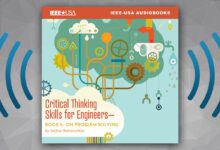
In today’s world, staying sharp outside your company is just as important as staying sharp inside your company. In May, IEEE-USA E-BOOKS is offering the award-winning, Staying Sharp-Volume 2: Tips for Staying Sharp Outside Your Company, free to IEEE members.
Volunteer in Your Community
Have you ever considered how working on a committee or working group in your city or town could help you advance your career, while also contributing to your community?
Serving as a volunteer on your local board of education, historical society, or in other civic programs is just one of many proven strategies that engineers, and really-all employees–can use to enhance their non-technical skills for career success, according to author Harry T. Roman.
In addition to his fulltime job, Roman served for eight years on his community’s three-member water commission. He ultimately became its president, leading 70 employees who provided 10 million gallons of water a day to 75,000 residents and businesses with a pumping station, well field, storage and transmission, and a distribution network. “What a learning opportunity!” he writes. “I learned so many new skills that I was able to bring back to my utility job–especially managing unusual operating situations, such as broken transmission and distribution piping, and pumping station failures. People in my company also took notice that I was managing and leading large numbers of professional and technical staff in my city. This municipal position helped corporate leaders understand my potential as a future leader in my company.”
Be Active in Your Professional Society
An active IEEE member for many years, Roman advocates involvement with IEEE and other professional societies, as an ideal way to add further to one’s professional experience. For example, participating in your local Section and attending its meetings, activities and awards celebrations are ideal opportunities for meeting other people–potential additions to your personal network ” especially when you need advice, assistance, or to consult professionally. “Consider serving in a higher-level volunteer office, and perhaps moving up to regional or national representation,” he advises.
Give Lectures and Tours
Another strategy he recommends for keeping skills sharp outside your company is being a docent at a library, museum or environmental center. “There’s nothing to keep you sharp like giving regular lectures and tours,” Roman says. “Speaking in public is a powerful tool for you to master. What’s more, people you meet will invariably strike up conversations, which could turn out to be excellent networking opportunities.”
Document Your Accomplishments
Roman also advises paying regular attention to your accomplishments and documenting them for use, when needed, to demonstrate your value. “In our sometimes chaotic workplaces,” he says, “the only one who is going to care about your personal growth is you. It is your biggest investment, and it represents real wealth to you.”
Now through 15 June, IEEE members can get a free download of this e-book by going to: https://ieeeusa.org/product/staying-sharp-volume-2-tips-for-staying-sharp-outside-your-company/. Log in with your IEEE Web account, add the book to your cart, and use promo code MAYFREE17 at checkout.
CALL FOR AUTHORS
IEEE-USA E-BOOKS seeks authors to write an individual e-book, or a series, on career guidance and development topics. If you have an idea you think will benefit members in a particular area of expertise, please email your proposal to IEEE-USA Publishing Manager Georgia C. Stelluto at g.stelluto@ieee.org.
Georgia C. Stelluto is IEEE-USA’s Publishing Manager, and Manager/Editor of IEEE-USA E-BOOKS.






